So Gavin Newsom, California’s governor, just told us Thursday to stay in our homes and not go out to restaurants, bars, events, places of worship, gyms, parties, or any other social activity. We’re to avoid non-essential social contact to slow the spread of the deadly COVID-19 pandemic, and to stay six feet or father apart — aka social distancing. He’s not the only governor to issue emergency orders.
When this global health crisis will reach its peak and begin to change course is a troubling unknown. Pharmaceutical scientists may be developing drugs that could play a vital role for change, but the medications aren’t going to be here for a while. Onlookers want to see the number of new cases flatten out and then diminish.
We’re advised by governors, the World Health Organization, and the Centers for Disease Control and Prevention, to stay informed and to practice preventive actions.
I think there’s one more step: finding reasons to be hopeful — to look for a silver lining. This is going to go on for awhile, and it would be better for loved ones and co-workers if we weren’t completely miserable to be around.
Here are a few resources and interesting news stories I’ve discovered.
Zoom offers an antidote to social distancing and isolation
If you’ve ever seen the 1968 science fiction classic, 2001: A Space Odyssey, you may remember a scene where a future space traveler businessman takes a break to call his adorable little daughter on a videophone. I saw the movie again a  couple of years ago, and thought, wow that will be wonderful when we someday can do something like that with such a crystal clear image and strong, consistent transmission. We could use Skype or FaceTime then, but there were a lot of glitches and inconsistencies.
couple of years ago, and thought, wow that will be wonderful when we someday can do something like that with such a crystal clear image and strong, consistent transmission. We could use Skype or FaceTime then, but there were a lot of glitches and inconsistencies.
That’s all changed with Zoom Video Communications and it’s remote conferencing services — which makes it seem like these participating people are right next door to you, and not 3,000 miles away. There are other products fulfilling the demand lately — Microsoft Teams, Slack, and RingCentral are out there — but for now Zoom is pervasive and everywhere with its free-to-low-cost services supporting video conferencing, online meetings, chatting, and other features. I’ve so far participated in two of these meetings, and now have a few more scheduled. Any question I’d had about it would be answered by someone on the call who’d already tried it out a few times and understood the control panel.
I’ve heard a few recurring themes — such as we’re already getting cabin fever stuck in our homes, unable to go out to dinner or do much of anything outside the house. There are a lot of stories about employees being put on unpaid leave for the next month or more; or having all their employee benefits covered but no pay for an unspecified period of time. A lot of comments are being made about dealing with fear and stress; I shared about how much I’d been remembering living through the LA Riots of 1992 and Sept. 11, 2001, both of which I happened to be in places pulled into the emergencies — at least for a few days (1992) or hours (9/11).
We can’t get close to anyone we’re not living with for now — especially to give and receive handshakes and hugs. We’re feeling an amalgam of stress, fear, dread, fatigue, and paranoia about the worst-case scenarios we’re hearing about in the media.
Giving thanks to the frontline
So far, I’ve heard a lot about the intense pressure that two segments of workers have been feeling over the past month or more — healthcare professionals and grocery store employees. Doctors, nurses, and healthcare workers are being praised in many European cities at least one minute each night as they come together in gratitude. That can take place in open windows or balconies in Rome, Madrid, Paris, Athens, or Amsterdam, where they send cheer and applaud people too busy working in hospitals non-stop to hear them.
In America, Larry Brilliant, the epidemiologist who helped eradicate smallpox, had this to say: “I’m seeing an incredible influx of nurses, heroic nurses, who are coming and working many more hours than they worked before, doctors who fearlessly go into the hospital to work. I’ve never seen the kind of volunteerism I’m seeing (now).”
Major grocery store chains are giving praise to their supermarket employees, who are feeling the pressure of serving frightened, demanding customers standing in long lines and searching for what they can get in toilet paper, paper towels, bottled water, pasta, spaghetti sauce, soup, baking goods, Clorox, and other popular products. Kroger is giving full-time employees a one-time “appreciation” bonus of $300 at its Ralph’s, Fred Meyer, and other retail brand stores. Albertsons Cos. will be installing plexiglass barriers in its checkout lanes to safeguard shoppers and cashiers — and will pay employees an extra $2 an hour as an “appreciation” bonus at its Albertsons, Safeway, Vons, Pavilions, and other retail brand stores.
“Our associates are working around the clock to keep our stores open for our customers. I am incredibly grateful for all they are doing,” said Rodney McMullen, Kroger’s chairman and CEO, in a statement. “The true heroes in this story are our associates, and we want to provide them with additional resources and support to help them continue their remarkable effort.”
Musk changes course, makes contributions for coronavirus patients
While Tesla CEO Elon Musk has been up to his usual antics lately by dismissing COVID-19, he’s now joining up with colleagues to contribute to support for patients impacted by the disease. He’s delivered more than 1,200 ventilators to California officials this week, an effort that will provide treatment for hospital patients with severe cases of COVID-19 — gaining kudos from Gov. Gavin Newsom. That followed soon after President Trump praised Tesla, General Motors, and Ford for contributing to the desperately needed equipment.
This happened about a week after Musk gained notoriety for dismissing the novel coronavirus in a SpaceX company email, and not long after a controversial Twitter post stating that that “the coronavirus panic is dumb.” Like his auto executive colleagues, Musk is having to face the shutdown of factories and consumers putting off purchasing their products. The Fremont, Calif.-based Tesla plant did close yesterday, after Musk had pledged to keep it open. Tesla’s stock has been hit hard, like all the other automakers and tech giants. But investors and the general public do expect Musk to show signs of being a good citizen, which he has gotten around to. Stock market analysts see that Tesla and other publicly traded companies are just going to have to wait until the novel coronavirus statistics begin dropping down.
Donations are starting to come in to fund solutions
Pop star Rihanna’s charitable organization, the Clara Lionel Foundation, has announced it will be donating $5 million to coronavirus response efforts to do its part to help limit the spread of COVID-19. The organization, which Rihanna named after her grandparents Clara and Lionel Braithwaite, said it will be making the donation to several organizations – including Feeding America, The World Health Organization’s COVID-19 Solidarity Response Fund, and International Rescue Committee. Funds will go toward supporting local food banks serving at-risk communities and the elderly in the US as well as the “acceleration of testing and care in countries like Haiti and Malawi.”
The donation will also go toward “protective equipment for frontline health workers and diagnostic labs,” healthcare worker training and virus prevention “in countries that will be on the frontlines of the COVID-19 response,” and the “distribution of critical respiratory supplies,” the group added.
Big-dollar donations have been pledged by the Bill and Melinda Gates Foundation and Bloomberg Philanthropies earlier this month that were aimed at supporting global response efforts to the COVID-19 outbreak. Donations are also rolling in from pharmaceutical companies supporting the research process, such as Novartis donating its malaria drug for testing.
The World Health Organization (WHO) has created a fund to prepare for and respond to the spread of the coronavirus. The COVID-19 Solidarity Response Fund anticipates a need of $675 million through April to address the worldwide outbreak, and said funding needs will likely increase as the pandemic evolves.
Funds will be used to support efforts in tracking and understanding the spread of the disease, ensuring that patients can access the care they need and that frontline workers can get supplies and information. Another goal is to accelerate the development of vaccines, tests and treatments, according to UN Foundation representatives.
CALSTART turning 2030 Policy Summit into interactive online experience
CALSTART is committed to bringing partners together to transform transportation for good. In light of the COVID-19 issue, the organization has modified its format of the Policy Summit to be a highly interactive web conference. It’s taking place tomorrow, March 25, from 10:00 a.m. to 2:30 p.m. Pacific time. The agenda has been revamped to accommodate a new format with a shorter day and a dynamic format with high-energy panels and hard-hitting keynotes. CALSTART encourages people to register now, as space will be limited. The cost is $75. A Zoom call-in number and link will be sent to your email on file. Sponsors include Southern California Edison, Cummins, Volvo, the Propane Education and Research Council, Roush CleanTech, and Toyota.

 the unforeseen future. It will take quite a while until the public can rest assured that healthcare professionals can stop the spread and bring a cure — or at least arrest worsening of symptoms — for those infected with the contagious respiratory disease. It’s been causing panic among those crowding supermarkets to purchase bottled water, toilet paper, sanitary wipes, and in the past few days, nutritional basics such as canned soup, pasta, and bread. Governments around the world are placing severe restrictions on travel and public gatherings in attempts to quell panic and spreading of the infection and disease.
the unforeseen future. It will take quite a while until the public can rest assured that healthcare professionals can stop the spread and bring a cure — or at least arrest worsening of symptoms — for those infected with the contagious respiratory disease. It’s been causing panic among those crowding supermarkets to purchase bottled water, toilet paper, sanitary wipes, and in the past few days, nutritional basics such as canned soup, pasta, and bread. Governments around the world are placing severe restrictions on travel and public gatherings in attempts to quell panic and spreading of the infection and disease. rides provided by Uber, Lyft, Via, Curb, and other firms, are usually taking away even more low fuel consumption and displacing mobility such as public transportation, biking, or walking. UCS recommends that these companies take efforts to electrify their fleets and increase their pooled rides. “For ride-hailing to contribute to better climate and congestion outcomes, trips must be pooled and electric, displace single-occupancy car trips more often, and encourage low-emissions modes such as mass transit, biking, and walking,” the report says.
rides provided by Uber, Lyft, Via, Curb, and other firms, are usually taking away even more low fuel consumption and displacing mobility such as public transportation, biking, or walking. UCS recommends that these companies take efforts to electrify their fleets and increase their pooled rides. “For ride-hailing to contribute to better climate and congestion outcomes, trips must be pooled and electric, displace single-occupancy car trips more often, and encourage low-emissions modes such as mass transit, biking, and walking,” the report says.